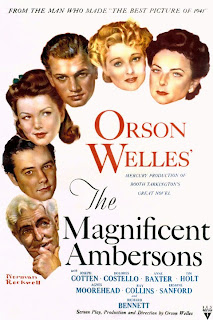The Magnificent Ambersons (1942)
Since this is the centenary month of Orson Welles, I thought I'd take a look at some films of his that I've never seen or haven't yet reviewed on this site. I have written about Citizen Kane, The Stranger, and Touch of Evil (and as an actor only, The Third Man). His career was so spotted by partially-made films and movies outside the Hollywood system that some of them are not available on DVD, at least not through Netflix. These include Journey Into Fear, MacBeth, and Chimes at Midnight.
Welles' follow-up to Citizen Kane, The Magnificent Ambersons, is most famous for having been taken away from him and re-cut by the studio. More than an hour was cut, reducing the film to a trim and fast-paced 85 minutes. The excised footage was destroyed, so it can never be restored to the original director's cut.
But here's the rub: the film is still great. It's based on the novel by Booth Tarkington, about the decline of a genteel Midwestern family and the changes over the turn of the century, when the automobile changed everything--for the good and bad.
The Ambersons are the richest people in Indianapolis. Isabel (Dolores Costello) is courted by the dashing Eugene Morgan (Joseph Cotten), but a drunken incident during a serenade persuades her to marry the dull Wilbur Minifer. They have a son, George, who is horribly spoiled. He grows up to be Tim Holt, and he hasn't changed much. He meets Morgan's daughter (Anne Baxter), and is in love with her, but can't abide Morgan or his business, automobiles. When his father dies, Holt is even more outraged when it is hinted that Morgan may ask him mother to marry him.
This is unmistakably a Welles film, and even though it was not shot by Gregg Toland (instead it was Stanley Cortez) the similarities are stunning. Welles and Cortez make great use of the interiors of the Amberson mansion. I was most stunned by a crane shot that starts with two people on the ground floor deep in the background, entering a room and closing the doors. The camera pans up to the second floor, where Holt is eavesdropping. It then pans further up to reveal Agnes Moorehead on the third-floor landing, telling Holt not to interfere.
Moorehead, as the spinster Aunt Fanny, is great. She was nominated for an Oscar but didn't win, and I remember reading in a poll somewhere that she was named the Best Supporting Actress of all time. I can't say I would disagree.
The film is mesmerizing to watch. Beyond its story, which is profound on the influences of the mechanized age on the old America, almost every shot is expertly made. The framing of the characters, the use of deep focus, the effect of snow (remember how great the opening scenes of Kane's boyfriend in the snow were?) are genius.
We'd all like to see Welles original cut, but even after the butchering by RKO, The Magnificent Ambersons is a masterpiece.
Welles' follow-up to Citizen Kane, The Magnificent Ambersons, is most famous for having been taken away from him and re-cut by the studio. More than an hour was cut, reducing the film to a trim and fast-paced 85 minutes. The excised footage was destroyed, so it can never be restored to the original director's cut.
But here's the rub: the film is still great. It's based on the novel by Booth Tarkington, about the decline of a genteel Midwestern family and the changes over the turn of the century, when the automobile changed everything--for the good and bad.
The Ambersons are the richest people in Indianapolis. Isabel (Dolores Costello) is courted by the dashing Eugene Morgan (Joseph Cotten), but a drunken incident during a serenade persuades her to marry the dull Wilbur Minifer. They have a son, George, who is horribly spoiled. He grows up to be Tim Holt, and he hasn't changed much. He meets Morgan's daughter (Anne Baxter), and is in love with her, but can't abide Morgan or his business, automobiles. When his father dies, Holt is even more outraged when it is hinted that Morgan may ask him mother to marry him.
This is unmistakably a Welles film, and even though it was not shot by Gregg Toland (instead it was Stanley Cortez) the similarities are stunning. Welles and Cortez make great use of the interiors of the Amberson mansion. I was most stunned by a crane shot that starts with two people on the ground floor deep in the background, entering a room and closing the doors. The camera pans up to the second floor, where Holt is eavesdropping. It then pans further up to reveal Agnes Moorehead on the third-floor landing, telling Holt not to interfere.
Moorehead, as the spinster Aunt Fanny, is great. She was nominated for an Oscar but didn't win, and I remember reading in a poll somewhere that she was named the Best Supporting Actress of all time. I can't say I would disagree.
The film is mesmerizing to watch. Beyond its story, which is profound on the influences of the mechanized age on the old America, almost every shot is expertly made. The framing of the characters, the use of deep focus, the effect of snow (remember how great the opening scenes of Kane's boyfriend in the snow were?) are genius.
We'd all like to see Welles original cut, but even after the butchering by RKO, The Magnificent Ambersons is a masterpiece.



Comments
Post a Comment